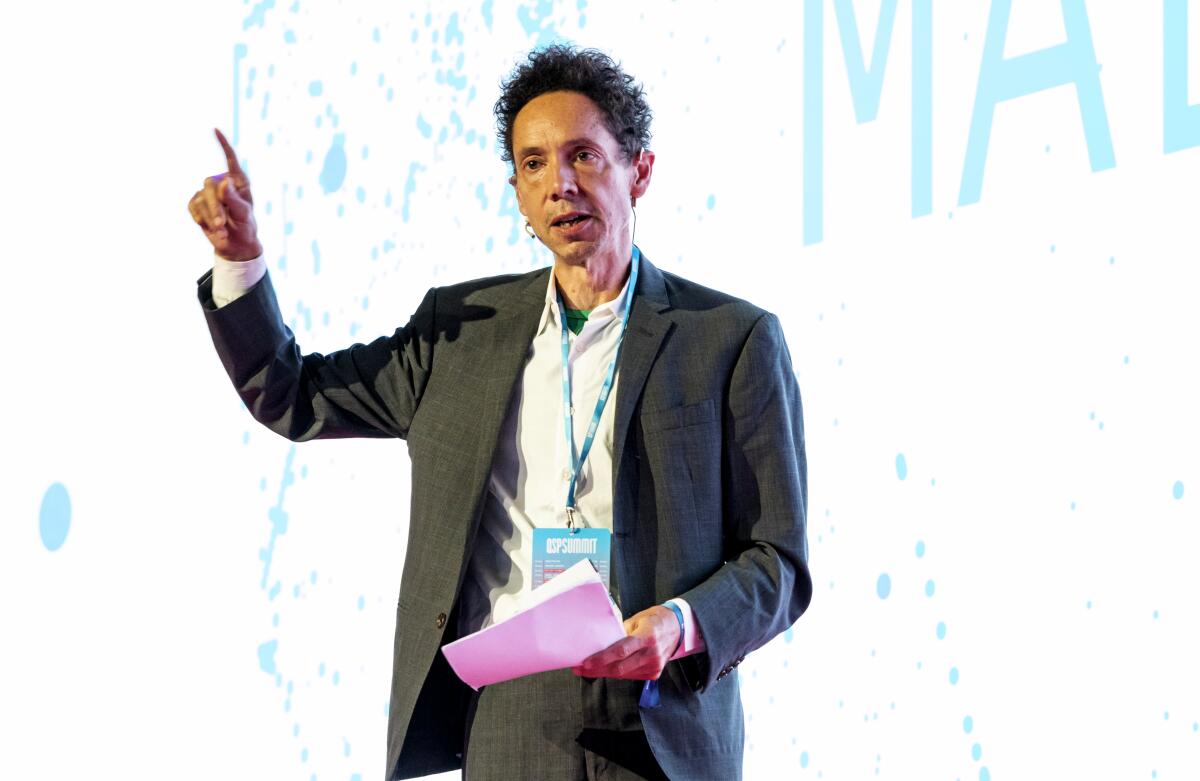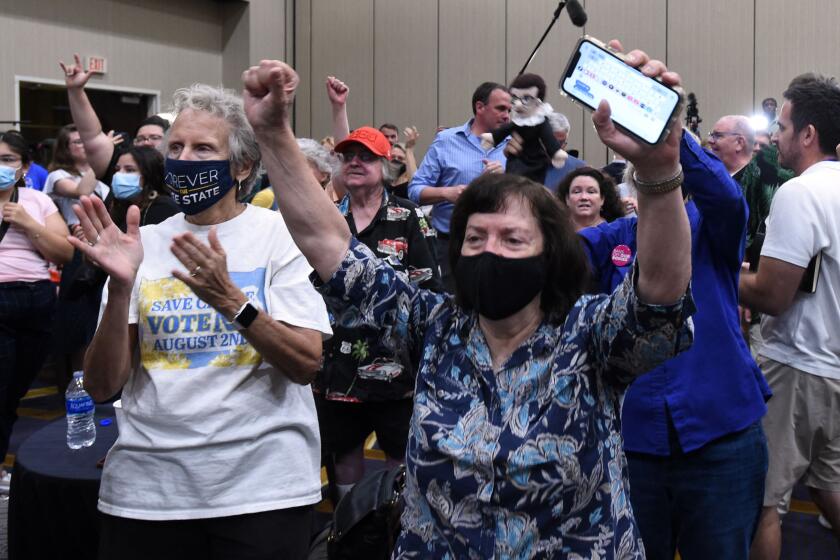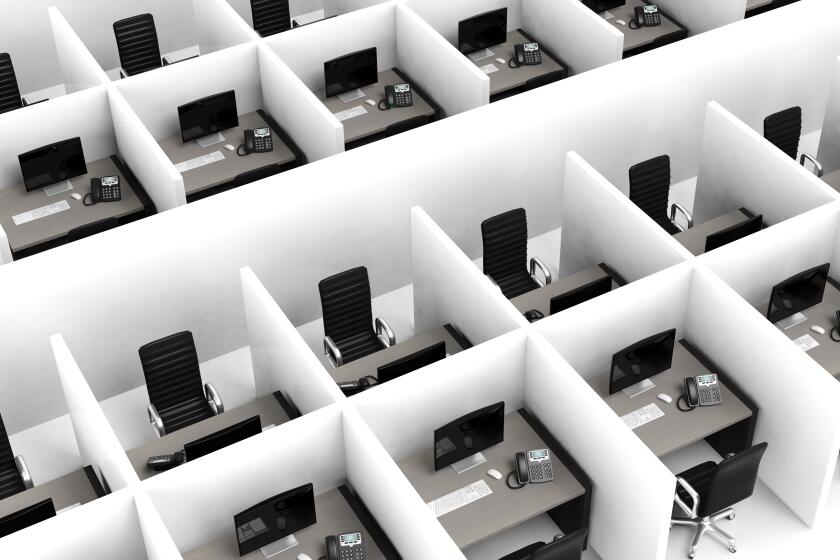Column: Hey, Malcolm Gladwell, I’m working in my jammies and I’m just fine

- Share via
On the podcast “The Diary of a CEO,” Malcolm Gladwell recently lectured the American workforce about the importance of returning to the office. Two and a half years into a pandemic, working from home is not, he said, in people’s best interest. They need to return to the real-time gaze of their bosses in order to feel like they are actually part of something.
“If you’re just sitting in your pajamas in your bedroom, is that the work life you wanna live? We want you to have a feeling of belonging, and to feel necessary. And if you’re not here, it’s really hard to do that.”
Many people were quick to point out that this was pretty rich coming from an author who does not work in an office, a man who has, in fact, written extensively about aversion to offices and his subsequent choice to write from his home and in cafes.
Although it is not at all surprising that a writer of books and essays would work from home (though cafes? come on), it is always delicious when someone puts their big ol’ foot in a pile of “do what I say not what I do.”
Instead of writing letters demanding protections in states with draconian abortion laws, showrunners should have a look at the state that just pushed back.
(That he exhorted workers of the world to unite and return to their cubicles on a podcast is also mildly hilarious — even with their increasing corporatization, nothing screams “I would rather do anything than work in an office” more than a podcast.)
He is not alone in his insistence that people need to return to the office to experience the psychological and emotional benefits of in-person contact with colleagues and supervisors. As companies attempt to return the pre-pandemic “normal,” it’s an argument that has been made in many quarters.
So many that it seems important to point out that the office, and all the congregational workplaces that term stands for, was not created to benefit anyone psychologically or emotionally. It was created for people to do work in the most efficient and least expensive way possible.
Most efficient and least expensive for employers, that is.
The personal costs of things like commuting, childcare, eldercare or figuring out how you were going to get the dog to the vet or yourself to the dentist have almost always been considered, you know, personal. None of the company’s business, or responsibility, as long as you were putting in the required hours at the office or requesting the necessary time off.
Obviously, employers are entitled to make things efficient and inexpensive — and once upon a time, not that long ago, that usually meant keeping the majority of their staff in one place. The place where, if nothing else, all the necessary equipment lived. Meetings had to be held in person because they were called “meetings” and there was no other means to exchange ideas in real time.
Initially, even advanced technology demanded congregation — early computers existed on closed systems that I do not understand though I do know the monitors and keyboards were too big to lug around. Phones had to be dialed, even when accessing your voicemail; work was often still done on paper with pens and pencils; and blah blah blah I am old and have been working for a long, long time.
Jennifer Coolidge is already a big star, but her first Emmy nomination, for “The White Lotus,” is next-level. To her, that’s both thrilling and scary.
And there has never been anything like a universal office experience. Some employers offered free snacks and cultivated a home-away-from-home atmosphere while others frowned on even the display of family photographs (and more than a few were filled with abusers).
In any case, no employer in the history of work ever thought: “Let’s require people to come to offices because offices are so beneficial to the psyche.” Even when technology increasingly made it possible for people to do work off-site, the argument was not “You should come into the office because you will feel better about yourself and your place in the universe” but “You should come into the office because it is more efficient for your boss to know exactly where you are during the work day.”
In many cases, that was true, or at least seemed true, for the simple reason that the workflow was built on an in-office model. Everyone did not have the technology, or the know-how, to adapt to off-site work on a large scale. And no technology was as effective as yelling across any given room.
(I really am trying to put the best spin on it without getting into the troubling, and very American, satisfaction some people feel when gazing at a large space in which everyone is busy working. For them.)
The pandemic forced that to change. In a matter of a few terrible, horrible, very scary weeks in the spring of 2020, office-based businesses had to come up with ways to operate remotely or die. Most, though not all, figured it out. These new skills came at a cost, and often involved layoffs, but at this point in time, the argument that the once office-bound masses cannot do their work remotely is ridiculous.
Which explains management’s sudden concern with the psychological damage remote work must be inflicting on their workers and how it can only be improved by daily in-person contact with their colleagues. “Honestly, dear workers, we are only thinking of you and your emotional needs. Like Malcolm Gladwell, we are concerned that working in your pajamas, with your dog at your feet, is taking a toll on you psychically in ways you may not know.”
Give me a break.
I say this as someone who absolutely and very deeply misses being in the office, surrounded by my colleagues and the chattering energy of the newsroom. The Times has been very careful in its policies regarding the pandemic; staffers can return to the office, on a day-by-day basis, but no one is required to be back, and social distancing remains a priority.
I recently went in for a few hours and the silence was heavenly. (My house was, at the time, filled with two kids, two dogs, a husband who can’t remember passcodes and people doing work on our floors.) It was also deeply sad. I missed, and continue to miss, my co-workers and all the urgent, idle, inspirational, gossipy, irritating, informative conversations I had with them in meetings and in passing.
When I walked into the building, I felt the exquisite reminder that I belonged someplace other than my home, that I was part of something larger than myself, and it was wonderful.
It also took me 60 minutes to get there and 90 minutes to get home, which reminded me of the years of frenzied day care drop-offs and pickups (always aware of my fortune that I could find and afford day care) and later, days when I left the house before my youngest went to school and often got home right around the time she was going to bed.
Joni Mitchell’s surprise performance at the Newport Folk Festival was just what we needed — a reminder that joy trumps despair every time.
And as much as I miss all those in-person conversations, I also remember many evenings when my husband would try to speak to me after work and I would hold up my hand, explaining that if one more adult said one more word to me, I would shatter into a million pieces, all emblazoned with “You got a minute?”
So I both long for the days when everyone was in the office and realize that it is, at best, not always ideal and, at worst, unsustainable. Even without the consideration of commute or family obligations, people should be judged by the quality of what they do, not the amount of “face time” they put in. Over the course of my career, I have put in nine-hour days at the office during which I accomplished very little and six-hour days at home when I accomplished a lot. It honestly depends more on the day than the location.
I realize I am speaking from my own experience and that there is no one-size-fits-all answer here. Which is precisely the point. Figuring out what work will look like now that we’ve proved the office is not an absolute necessity will be messy and full of compromise.
After years of being forced by a global pandemic to abandon their offices, some people do feel unmoored and lonely, or exhausted by attempts to balance work and family literally every five minutes in a limited space. Others cannot imagine returning to a life that requires them to be boxed away for eight-plus of their waking hours five or more days a week, or forced to engage in lengthy meetings or conversations about problems that could be solved with a two-sentence email.
If Gladwell and others are truly concerned about the psychological state of the workforce, they would do well to remember that everyone’s needs are different, and those needs often change. (Also, telling people how they must be feeling is almost never a good idea. Start by asking.)
If anything, we should all be rejoicing. Never before has this country’s work culture been given such a chance to hit a full-on form-follows-function reset. Never before have we been able to acknowledge, with tangible proof, that function can take almost any form. That there are days when you are killing it from the comfort of your sofa and days when it really is best to put on clothes with a waistband and sit in a conference room.
Either way, no one needs to be lectured on how dropping our kids at day care the moment it opens or making an hour commute so the boss can find us at a glance is going to make us feel “necessary.” Frankly, it’s a little late in the day for employers to be expressing concern about people’s existential state. Worry more about providing day care, healthcare and a living wage, employers; if we miss our colleagues, or the comfort of the office environment, we’ll come in.
And as long as we’re getting the job done, what do you care if we’re wearing our pajamas?
More to Read
The biggest entertainment stories
Get our big stories about Hollywood, film, television, music, arts, culture and more right in your inbox as soon as they publish.
You may occasionally receive promotional content from the Los Angeles Times.














